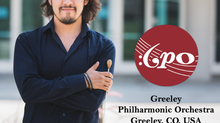Critical Analysis of: Alien Adventures: Exoticism in Italian-Language Baroque Opera
- Diego Barbosa-Vásquez
- Feb 14, 2018
- 7 min read
Alien Adventures: Exoticism in Italian-Language Baroque Opera By Ralph P. Locke
Critical Analysis by Diego Barbosa-Vásquez
The article describes the influences of foreign cultures in the early operas of the Baroque (17th and early 18th Centuries). The author is focused in describe the exoticism influences in the libretto construction and how the story and characters are building under those influences. This information is important for the people that is involved in the opera production, specific in the artistic decisions of production. In addition, despite the fact of the author’s precision giving arguments and supporting details to each idea presented in the article, Dr. Locke overwhelms the reader with many specific information that can be placed in footnotes to create more fluent article.
The exoticism in the Baroque Opera
To start is important to understand the liability of the present article. Doing a research the reader can infer that the author expertise in the exoticism is very strong.[1] 2 published books and a good amount of articles about the topic are great clues that the author has a deep understanding of the topic. In addition, as scholar with PhD of Chicago and Professor Emeritus of Musicology of Eastman School of Music his credibility in musicology aspects is important.
In terms of the article, despite the fact of the first assumption of primitive baroque operas based in Greek and Roman historical figures, the author starts to point out how the thematic of many operas can be traced to far regions.[2] The Egypt, Chinese, Muslim and other cultures are placed in Italian Opera Libretti creating a necessity of a research in how foreign cultures can influence those Italian works.[3] The way that the author uses to explain those influences is the exoticism, however the author did not explain its definition clearly. Is important to clarify the word as the use of culture characteristics of foreign regions in a work as a way to be catchpenny or intriguing. An important question at this moment for the author could be how this exoticism was influenced the cultural live in Italy at those years and how other arts were affected by it. This explanation at the beginning will give to the reader a broad perspective of the exoticism.
In terms of the opera as influenced by exoticism, the author describes different scholar arguments around the topic expressing that are there but are just some specific parts probably not consider as a strong influence[4] However, by using descriptive examples, the author states that the using of distant time and distant place are clear clues that the exoticism is placed in the opera.[5] In this aspect is important to highlight that the examples are used in a very good way, those allow the reader to understand the idea and agree with it. However, the way of describing the evidences is very specific giving to the lecture a not fluent rhythm, an aspect that is placed in the entire article. A better solution could be leave this kind of very specific information in footnotes for the scholars or readers that want to very or go deep in those.
Another important aspect that the authors describes is how the exoticism creates opera characters based in the stereotypes and cultural myths about foreigners.[6] Despite that the fact is illustrated by musical enumerations allowing the reader to agree with the idea, his explanation of the reasons for this important idea are very weak. According to Dr. Locke it can be explained due to the lack of information about other cultures.[7] However, this idea has not specific support and even is counter-argued by the author later where is describing the foreign interaction with the Italian and Western cultures.[8] A stronger research about this topics is necessary in order to clarify how many information the society of this era had about other cultures.
The author describes a second related idea that is very interesting to analyze deeply. The foreign characters, or characters that are influenced by exoticism influences, in words of the author, are roles that are constructed in a base of western perspective of the culture.[9] What this means is that the foreign traditions are understanding under the western culture creating characters that are perceived as a tyrants or misconducting.[10] This idea is one of the most important aspects of the article. There the author created an advance in the musicology field and in general to the academic world in humanistic and artistic field.
The importance of a real and cultural correct understanding need to be the rule for any serious scholar at this moment in order to do a correct analysis. However, this idea is difficult to be performed because the scholar will have its own background that will interfere in its understanding. When a scholar is trying to analyze or understand a work that was done by composers and librettist of different styles[11] or cultural behaviors is previous background or culture will interfere. An explanation of this idea can be the problems that a theory major will have at the moment of an analysis of African music through western traditions. Or the understanding of the Egypt’s polygamy through the prism of the Christian behaviors of western cultures.
This idea is very important because for the present Critical Analysis author, this is a call for the cultures with lack in research to write about their specific cultures. There is no more important and trained person in the world, with its whole understanding of the culture and styles, to write about those topics and share with the academic world its history from an official or primary source.
Returning to the Dr. Locke’s article, this is an important source to be consulted by people involved in opera production, more specific related with the artistic decisions: Scene Director, Singers, Music Director, Artistic Manager, Costume and Art Designer. However, for orchestra members and performers that are more related with the music and how the style[12] is perceived and performed is not a very useful article. The authors give just few examples about the exoticism influenced music. The most remarkable are, the description of onstage instruments in the Cleopatra[13]. However, this explanation is more related with the Scene proposal for the opera more than a specific style in the music. The second, is the description of Haydn’s Tamerlane arias expressing the “spiky brilliance” and the way that the music is constructed to create laments and anger.[14]
An interesting advance to the musical field to this topic will be a more musical description of how the exoticism influenced the composition style of the operas. At this moment the idea is not clear, the reader can infer that the music was affected by this exoticism or no matter how far the libretto goes the music keeps the same western styles. A fact that can be confirmed analyzing some works as Cleopatra Arias from Handel[15] or the Tamerlano’s Recitative Voglio Strage[16] but from the musical approach. There the listener that is not focused in the words, cannot infer that the opera has exoticism influences, because the structure, textures and horizontal and vertical models of the music are totally western traditionally.
The third important idea that the author is giving to the reader is that the exoticism is a result of political and marketing decisions due to the commercial relation with foreign countries.[17] This is a very interesting idea but the facts to support it are not enough described. Thus is important to understand that the music at this era was result of a very strong patronage behavior of the powerful people[18]. For the royalty, church and rich business people was very important to show his power and the music was one of the most powerful ways to do that.[19] To this information will be important to add supporting analysis of the importance to show knowledge of the cultural behaviors of foreign countries to develop business and political relations with those territories. Despite the fact that the author implies that and for the reader could have sense is important to be as careful the author is with the other ideas.
Conclusion
The article is a good source for the people involved in the opera production world but focused in the artistic on stage decisions. Three important ideas can be analyzed as an advance on the field. First, the baroque operas were influenced by exoticism in the libretto construction. Second the characters were influenced by it too but with the western prism. Third, the political and marketing behaviors of the era facilitates or influenced the exoticism. Furthermore, the article is clear in the ideas but there is a lack of musical exoticism influences more than the libretto. Second, the fluency of the article is affected by the saturation of information that can be placed in footnotes.
[1] Eastman School of Music, “RALPH P. LOCKE,” Eastman School of Music, accessed January 30, 2018, https://www.esm.rochester.edu/faculty/locke_ralph/.
[2] Ralph P. Locke, “Alien Adventures: Exoticism in Italian-Language Baroque Opera,” Musical Times 150 (2009): 53-69, accessed January 30, 2018, https://www.dropbox.com/home/GMUS%20501/Readings?preview=Locke+-+Exoticism+in+Baroque+Opera.pdf. (Page 53)
[3] Ibib. (Pages 53, 54)
[4] Ibid. (Page 54)
[5] Ibid. (Page 54)
[6] Ibid. (Page 55)
[7] Ibid. (Page 55)
[8] Ibid. (Page 67)
[9] Ibid. (Page 55)
[10] Ibid. (Page 55)
[11] Understand the style as the whole basic concepts that can define the horizontal, vertical, structure, colors, textures, rhythmic approaches of a work.
[12] Understand the style as the whole basic concepts that can define the horizontal, vertical, structure, colors, textures, rhythmic approaches of a work.
[13] Eastman School of Music, “RALPH P. LOCKE,” Eastman School of Music, accessed January 30, 2018, https://www.esm.rochester.edu/faculty/locke_ralph/. (Page 60)
[14] Ibid. (Page 66)
[15] George Frideric Handel, “Cleopatra - Arias from Giulio Cesare in Egitto, HWV 17: Atto primo - Scene 7: Tutto può donna” (music video), directed by Emmanuelle Haïm, posted on 2011, accessed January 31, 2018, https://www.youtube.com/watch?v=ZllSAn34sto&list=PLNbRBYXMXwo3WzwhO4Dow-JkHoYpYWrzj&index=2.
[16] George Frideric Handel, “Tamerlano: Recitative + Voglio Strage” (music video), directed by Paul McCreesh, posted on Oct 9, 2009, accessed January 31, 2018, https://www.youtube.com/watch?v=uFyL6wwdte8.
[17] Eastman School of Music, “RALPH P. LOCKE,” Eastman School of Music, accessed January 30, 2018, https://www.esm.rochester.edu/faculty/locke_ralph/. (Page 57)
[18] W. F. Prizer, ISABELLA D'ESTE AND LUCREZIA BORGIA AS PATRONS OF MUSIC: THE FROTTOLA AT MANTUA
AND FERRARA. Journal of the American Musicological Society, 1985. 38(1),
[19] Richard Staines, “Obrecht at 500: Style and Structure in the Missa Fortuna Desperata.” Musical Times; 146 (Summer 2005): 19-45. Accessed January 31, 2018. https://drive.google.com/drive/folders/0B9D_9OjR4QF3VF9pWjRXeklOb0E
This Critical Analysis is Partial Fulfillment of M.M. in Opera and Orchestra Conducting at APU































Comments